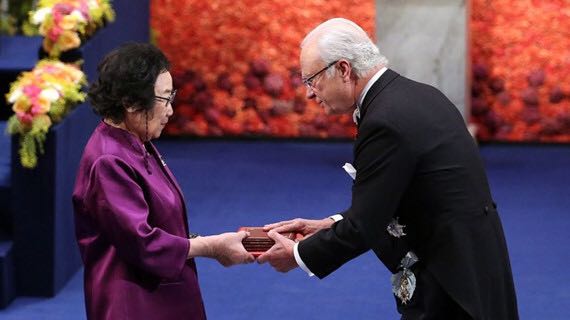This is NEWS Plus Special English. I'm Mark Griffiths in Beijing. Here is the news.
This year's Nobel Prize laureate for physiology or medicine, Tu Youyou, has called for joint efforts worldwide to combat malaria and develop more potential uses for traditional Chinese medicine.
Eighty-four-year-old Tu made the appeal at a news conference at the Karolinska Institute in Stockholm, Sweden. She collected China's first Nobel Prize in medicine at the award ceremony last Thursday and attended the Nobel Banquet and a Royal banquet.
Tu said malaria is a pandemic that can easily get out of control, especially in low income regions including Africa. So all parties should, under the framework of the World Health Organization, try their best to delay the process of artemisinin resistance.
Tu won the prize in early October for her lifesaving discoveries concerning artemisinin, a novel therapy for fighting malaria.
Currently, the emergence of resistance to artemisinin is an urgent public health concern and threatens the sustainability of the global effort to reduce malaria.
To date, parasite resistance has been documented in three of the five malaria strains known to affect humans.
Tu said it is difficult to develop a new drug in the next decade, and it may be too late if malaria becomes widespread, adding that she was deeply worried about this possible outcome.

This is NEWS Plus Special English.
Beijing has upgraded its alert for air pollution from orange to red, the most serious level. The alert was raised last Monday afternoon.
This is the first time the capital has issued a red alert, which lasted from Tuesday to Thursday.
Beijing's Education Commission decided to suspend classes in all elementary and middle schools, kindergartens and extracurricular training schools during the alert. Teachers were encouraged to give learning advice to students via Internet and other communication tools.
Car use was limited with car use being allowed on the roads on alternating days depending on the odd or even numbers on their license plates. In addition, 30 percent of government cars were banned from the streets on an odd-and-even basis.
According to the Beijing Municipal Environmental Monitoring Center, heavy air pollution lingered until Thursday. It was expected to disperse on Thursday afternoon with the arrival of a cold front.
This is the first time Beijing has issued a red alert for smog since 2013 when the city adopted an emergency response program for air pollution.
Four-tier alerts, namely blue, yellow, orange and red, are issued on "heavy pollution" days. Red alert, the highest, is issued for heavy pollution that is expected to last for more than three days.












